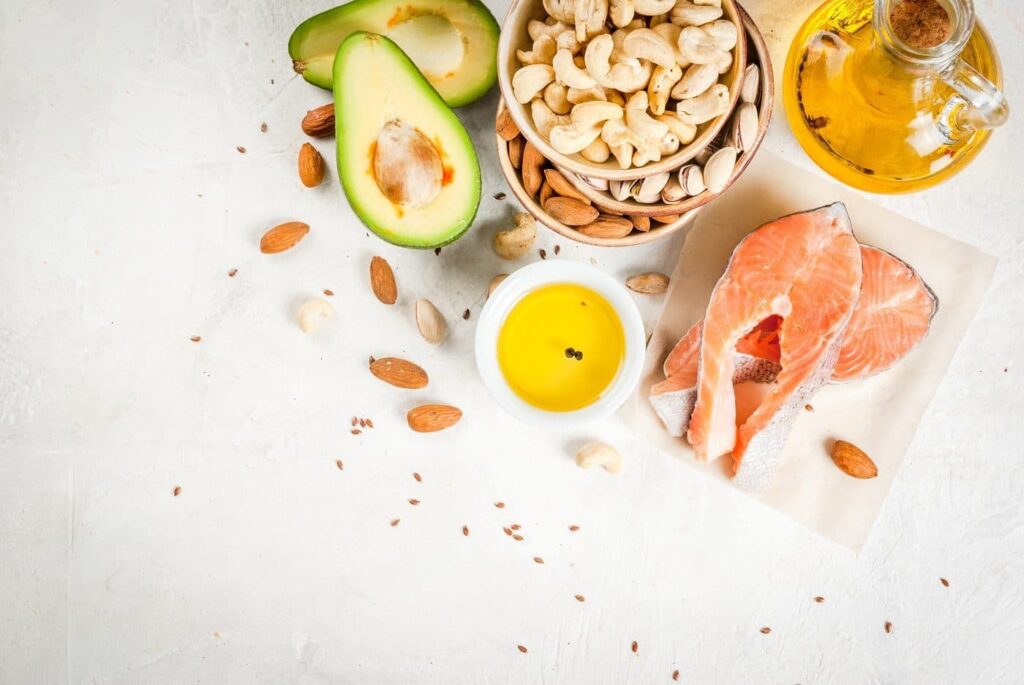There is a lot of information out there pertaining to good fats versus bad fats. For many years, it was recommended to eliminate fats from our diets as much as possible. Fat-free and low-fat foods were encouraged and stocked on the shelves at the grocery stores. However, those changes did not make us healthier. While cutting back on the harmful fats, we at the same time were cutting back on the healthy fats. There are definite types of fats that are harmful and do play a role in the development of chronic health conditions such as diabetes, obesity, and cardiovascular disease. However, there are other fats that actually help to promote overall good health. This post will help to show the difference between all types of fats.
Dietary fat is found in foods from both plant and animal sources. Our bodies need some fat from food to work properly. Here are some of the main benefits we get from dietary fats:
– Insulates our bodies
– Protects vital organs
– Is a major source of energy
– Needed for vitamin absorption (Vitamins A, D, E, K)
Bad Fats
There are two types of fats that have been shown to possibly cause harm to your heart: saturated fats and trans fats. These types of fats are typically solid at room temperature. Such foods include butter, margarine, beef or pork fat, and shortening.
Saturated fats are typically based from animal sources that include:
– High-fat dairy products (butter, cheese, sour cream, ice cream, whole milk)
– Fatty cuts of beef and pork
– Oils such as coconut, palm, and cocoa butter
– Lard
– Dark chicken meat
An excess consumption of saturated fats can increase low-density lipoprotein (LDL) cholesterol levels which can lead to heart disease and type 2 diabetes. These fats should be avoided or consumed sparingly.
The worst fats for you are trans fats. Trans fat is a byproduct of a process called hydrogenation that is used to turn healthy oils into solids, which in turn prevents them from becoming rancid. On food labels, trans fats are usually listed as partially hydrogenated oil. These types of fats are often found in:
– Baked goods (cakes, pastries, cookies)
– Margarine
– Vegetable shortening
– Fried foods
– Processed snack foods
Just like saturated fats, trans fats can raise LDL cholesterol. However, it can also lower high -density lipoprotein (HDL) levels which is our good cholesterol. Trans fats can raise our heart disease risk 3x higher than saturated fats. Trans fats have no health benefits. There is no safe level of consumption.
Good Fats
Good fats primarily come from seeds, nuts, and vegetables. They are typically liquid at room temperature. These types of healthy fats should be included in your diet in moderation. The two categories of healthy fats include monounsaturated and polyunsaturated fat.
Monounsaturated fats: This type of fat has been shown to improve blood cholesterol levels and lower your risk of cardiovascular disease. The discovery that monounsaturated fat could be healthy, came from a 1960s study that showed that people in Greece and other Mediterranean countries experienced a low rate of heart disease despite a high-fat diet. However, the main fat in their diet was olive oil, which is mainly monounsaturated fat. Foods that include this type of fat include:
- nuts (peanuts, pecans, almonds, cashews)
- vegetable oils (olive, peanut, canola)
- avocado
- peanut butter and almond butter
Polyunsaturated fats: These types of fats are essential fats that are needed to support normal body functions. We must obtain these types of fats from our food, since our bodies cannot make them. They are used to build cell membranes, aid in blood clotting, support muscle movement and reduce inflammation. They can also decrease your risk of heart disease by lowering blood cholesterol levels. Some common types of polyunsaturated fats include:
- vegetable oils (corn, safflower, soybean, sunflower, sesame)
- walnuts
- seeds (sunflower, pumpkin, sesame)
- tofu
- roasted soybeans
Omega-3 fatty acids are a certain type of polyunsaturated fat that is especially beneficial to the heart. These acids can be found in salmon, herring, trout, sardines, flax seeds and canola oil.
Even though healthier fats are important to add to our diets and to support overall health, it is still important to limit consumption of them since all fats are high in calories. Here are 3 takeaways that will help lead to better health:
- Reduce foods in your daily diet that are high in saturated and trans fats.
- Replace bad fats with healthy fats (monounsaturated and polyunsaturated).
- Monitor overall consumption of fats and stay within a proper daily calorie range to support your own personal goals.
If you are interested in losing weight and learning more about adopting a healthy lifestyle, call your closest BlueSky MD office to schedule an appointment with our wellness team.



